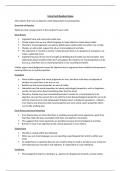Moral Anti-Realism Notes
Anti-realism: there are no objective mind independent moral properties.
Overview of theories
World-to-mind: change what’s in the world to fit your mind.
Error theory
Cognitivist view and moral anti-realist view
Mackie argues that we use ethical language to make objective claims about reality.
Therefore, moral judgments can express beliefs about reality which are either true or false.
Mackie, an anti-realist, argues that all our moral judgments are false.
The statement of “murder is wrong” is false because there is no property of wrongness: we
make a systematic error.
Cognitivst because of how we’re brought up (thinking that morality can be true/false). Also
statements about morality which don’t presuppose the existence of moral properties can be
true (e.g., that there are no moral properties) is true according to Mackie.
Mackie argues moral judgments cannot be objective due to arguments from relativity and queerness
meaning there are no moral properties.
Evaluation
Moral realism argues that moral judgments are true, and their truth does not depend on
whether we want them to be true or not.
Realists say that moral properties are part of reality.
Naturalists say that moral properties are about psychological properties, such as happiness,
and do not have to be about something other than the mind.
Therefore, Mackie may have misunderstood what it means for a moral property to be
objective. He says they cannot be to do with the mind. But psychological properties are to do
with the mind and are mind-independent (Mackie hasn’t considered naturalism) – Mackie’s
error theory only presumes that moral properties are some weird, queer properties which
are not like anything else.
Error theory and moral reasoning
Error theory does not show that there is anything wrong with moral arguments, apart from
that they make the false assumption that there are objective moral facts.
This suggests that moral arguments are pointless because all moral judgments are false.
But this is more of an objection to the central argument in error theory.
Subjectivism
Morality is rooted within the individual.
When you use moral language, you are reporting a psychological fact which is within your
mind.
So subjectivism is cognitivist because you could be lying on what is actually in your mind, but
anti-realist because morality is not objective, it’s dependent on each individual.
Emotivism
Moral judgments express a feeling (e.g., approval or disapproval) towards a certain action.
, Ayer uses the verification principle to reject cognitivism. Moral judgments don’t fill either
condition, so are philosophically meaningless.
Ayer rejects intuitionism due to its subjectivity.
Therefore, he comes up with emotivism, where the purpose of moral judgments is to
influence how we behave (expressions of approval and disapproval). Moral terms are
dynamic.
Also, emotivism easily explains how moral judgments motivate us. If moral language was just
descriptive (like realists say it is) then it’s strange that they would motivate us.
So, emotivism connects the meaning of ethical statements to caring, approving,
disapproving, and feelings in general.
Non-cognitivism and moral language
Non-cognitivism depends on moral language having one function (e.g., motivating us to act
and so is therefore incoherent), but it doesn’t. It has multiple functions.
Cognitivism does not face this same objection: it accepts that moral statements are objective
and then can be understood in different ways (what we make of them).
Problems with emotivism
Issue of moral language: specifically moral reasoning
One of the most powerful objections to emotivism is that it seems to entail an unsatisfactory
view of ethical discussion. If I say, ‘abortion is wrong’ and you say ‘abortion is right’, I am just
expressing my disapproval of it and you are expressing your approval. I’m just saying ‘Boo! to
abortion’ and you’re saying ‘Hurrah! for abortion’. This is just like cheering for our own team
– there is no discussion, no reasoning, going on at all. Even worse, emotivism claims that we
are trying to persuade and influence other people’s feelings and actions. But trying to
influence people without reasoning is just a form of manipulation (e.g., degradation to
propaganda). There is no rational criterion for a good moral argument, if I can influence your
feelings then it is good, almost feels degraded to advertising. Moral statements have more
value than this – e.g., to show what is good. Ayer tries to respond and say well this is only
one part of what morality is; but it is incorrect that this is the distinguishing factor, what is
good seems to be the distinguishing factor.
Moral language isn't always emotive; it can be dispassionate, seeking to assert reasoned
principles (as in, doesn’t have the capacity to change daily). This is what prescriptivism
claims. Emotivism fails to understand or explain how you can rationally change your attitude
on a moral statement. It merely says your view is whatever emotions you feel. But what if,
after deliberation, you change your mind? Surely this is due to reason and not emotion.
Emotivism cannot explain this. There is no consistency (e.g., ice cream).
Ayer response: Ayer thought this objection partly false, partly true. It is false because
emotivists claim that there is a lot more to ethical discussion – the facts. When arguing over
animal rights, say, we are constantly drawing facts to each other’s attention. I point out how
much animals suffer in factory farms. You point out how much more sophisticated human
beings are than animals. And so on. Ayer says all the discussion is about the facts. If we both
agree on the facts, but still disagree morally, there is no more discussion that can take place.
And this is why the objection is true – but not an objection. When all the facts are in, there is
nothing left to discuss. We have different viewpoints and settle on disagreement due to
moral conditioning/ cultural conditioning – presupposing a system of values.




